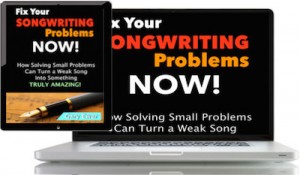If you find it hard to finish songs, this may be the cause: You haven’t started properly. You’re too focused on pulling all the elements of a good song together, and you don’t yet have one good main idea.
You’re starting too big. You vamp away on two or three chords, and hope a song happens.
 If you’ve finished your song, but you’re finding that it’s just not sounding right, check out the ideas in this eBook. It shows you the most common reasons that songs fail, and offers solutions that you can apply to your own songs.
If you’ve finished your song, but you’re finding that it’s just not sounding right, check out the ideas in this eBook. It shows you the most common reasons that songs fail, and offers solutions that you can apply to your own songs.
So the whole songwriting project stalls because you’ve been focusing on the final product without giving enough thought to all the individual bits that eventually get pulled together to make a song.
So that would be Tip #1: Unless a fairly complete song enters your mind in an almost complete state (and that will happen occasionally), you need to concentrate on getting a good main idea happening.
Most of the time, that good main idea will be the song’s chorus hook — the bit that everyone’s going to sing, and going to remember. Once that’s happening, you can try different ideas for your verse. You can try things, toss them out, try again, but at least you’ve still got that main chorus hook, which is a lot.
If your songwriting process constantly stalls, here are some more tips to add to Tip #1 above:
Tip #2: Let music guide your process.
It’s not absolutely necessary to know what your song is going to be about, at least not right away. Your audience doesn’t typically use topic as an initial source of attraction to a song.
So don’t be afraid to simply let the music happen, and then see where those sounds take your thought process. Topic can come after music.
Tip #3: Don’t keep using the same set-up to start songs.
If you find yourself always sitting on the edge of your bed, strumming chords to get song ideas happening, you’re basically going down the same creative road time and time again.
There’s little hope for innovation if you start every song the same way. So instead of strumming notes on a guitar, start playing ideas on a keyboard. You don’t need to be an accomplished keyboardist to use the instrument to generate song ideas.
Also, use a different room, write at a different time of day, try a different genre… do whatever it takes to change things up at the start of your process.
Tip #4: Keep a ‘Song Ideas’ Journal.
It’s important to keep all the ideas you come up with, because those ideas are where you’re likely going to find your next song.
And it’s important to think of it as a “Song Ideas” journal, not an “Unfinished Songs” journal, because there’s all sorts of negativity that comes from thinking that you simply couldn’t finish a song.
Tip #5: Look through your lyric for a possible lyrical hook.
If you’ve got the makings of a lyric, or if you have a poem, but don’t know how to start turning it into a song, it’s probably not the best idea to start at the beginning of the lyric, trying to come up with melodies.
The better approach is to get the hook happening first, and you do that by looking through the lyric and finding those two or three words that really click — that sound great together — that imply rhythm.
Once you’ve found those words, you’ve likely identified the chorus, the part that’s going to sound great when repeated. Once you’ve got a chorus idea happening (i.e., you’ve got a bit of melody, a mood, a rhythmic treatment, etc.), move back to the beginning of your lyric or poem, and you’ll suddenly find the task of setting it to music a little easier.
Conclusion
There is no one set of rules that tells us how to write. But there are principles — guidelines — that will help. The most important of those tips is probably Tip #1 – Think small, get a good, short idea happening.
Once you’ve got that, you’ve got a better shot at creating ideas that can partner up well with it.
 Written by Gary Ewer. Follow Gary on Twitter
Written by Gary Ewer. Follow Gary on Twitter
Thousands of songwriters are using “The Essential Secrets of Songwriting” ebook bundle to improve their songwriting technique. If you’re looking for excellence and consistency, get the bundle today. Comes with a FREE COPY of “Use Your Words! Developing a Lyrics-First Songwriting Process.”










